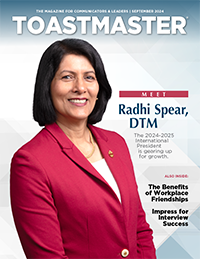
Sometimes no matter how much preparation you do for a speech—no matter how much you memorize, rehearse your material, exercise your voice, or map out how you’ll move onstage—things go awry. Events happen that you would never have anticipated.
The following four situations are actual ones I’ve found myself in as a speaker.
1
An electrical surge caused the bulb to explode in my 35mm slide projector. (Yes, this was before PowerPoint.) Smoke arose from the machine and the screen went dark as the audience of 700 tax accountants started to laugh, thinking I had done this as a joke. Then the lights in the room began to blink as a fire warning went off, and I stood holding the microphone.
2
A large drunken man stumbled into the banquet room and yelled to all 400 attendees that he was ready for a fight. They sat in stunned silence, I paused mid-speech, and he surveyed the room for an opponent.
3
At a huge convention banquet, from the head table, I had eloquently begun my speech with great audience responses. Then about two minutes into my big story I suddenly realized that I hadn’t told the listeners why this story would make sense to them. I forgot to deliver the set-up that would explain the rest of the story and make my big punchline meaningful.
4
My alarm went off just after 5 a.m., before my 8 a.m. keynote. I noticed a strange feeling in my throat and quickly realized that I had no voice. Although I felt fine otherwise, I couldn’t speak above a whisper.
In none of the above instances was my speech preparation, content, or delivery style going to determine success or failure. Likewise, neither how well I knew my audience nor how confident I felt about my material was going to help me. I could be distinguished, certified, accredited, and glorified, and I still couldn’t have anticipated any of those situations. But I desperately needed a solution.
Don’t think about your dilemma, think about the solutions.
Speaking is my profession; I have presented more than 3,500 speeches around the world. I’m a past president of the National Speakers Association, a Certified Speaking Professional, and a member of the Speaker Hall of Fame. And yet, even with all of that experience, sometimes my speeches don’t go as anticipated/planned/practiced/hoped. But part of being a good speaker is knowing how to adeptly handle the unexpected.
In this Toastmasters Podcast episode, professional speaker and 2001 Golden Gavel recipient Jim Cathcart reveals stories and tips for what to do when the unexpected happens onstage.
Take a moment and reread the four true scenarios at the opening of this article. Think about what solution or approach you would have tried and then read how I handled those situations.
The Fire Alarm:
When I was facing the fire alarm, along with 700 alarmed audience members, I realized it was up to me to provide a solution. It would have been dangerous to take extra time to call on the meeting chair and turn over the mic. So, I said, “Ladies and gentlemen, we don’t know if it’s really a fire or not, but we can’t take that chance. Would the 350 of you on this side of the room (indicated with my hands), please exit through those doors in the back of the room. Don’t use the elevators to get up to the main floor, take the stairs and meet me outside. For those on this other side of the room, please follow me through this side door and up the stairs to the street. None of these other exit doors lead out, they simply take you to a hallway that loops around to the two exits I’ve shown. Please exit now!”I waited to ensure they were following directions, then led my group to the side exit staircase. Notice, I knew where the exits went. That’s because I had come to the meeting room the day before and checked them. Most speakers will check lighting, sound, and staging, but few also think to check the emergency exits.
If you have the microphone and their attention, then you’re in charge of their safety. Know a solution and guide them with confidence.
Once we were outside, I assembled everyone on the steps of a nearby building and did an open-air, shortened version of my speech for anyone interested. Five hours later we were allowed back into the hotel. The meeting chairperson was thrilled with what I had done and recommended me to many other clients.
The Lumberjack:
Again, I held the microphone and realized somebody needed to take action, so I spoke loudly, “Would eight of the largest men in the room please rise? Seriously, stand up right now where you are. Okay, that’s four, five, thank you. Now we need three more. Yes, there you are! Thank you. Now, would you eight gentlemen please help this fellow find the exit?” As they turned toward him, he rapidly stumbled out of the room and the security guard took him away.How did I know to do that? I didn’t. It came to me on the spot but thank heavens it did! The common denominator here is that, once again, I was the guy with the mic. So, I was the logical one to help find a solution. The worst thing I could have done was to tell him to leave or take him up on his challenge.
The Meaningless Punchline:
Since I had not explained the setting and meaning of my story, I knew it was going to end badly. So, I stopped mid-sentence and leaned forward dramatically, I beckoned the audience “come here,” and with my crooked finger I encouraged them all to lean in. Then I said, “Here’s a tip for those of you who give speeches. If you are ever giving a presentation and in the middle of it you realize that you didn’t explain why your story would make sense … (I paused) … admit it. You might as well tell the truth. Now, in the story I was telling …” and I explained the missing set-up. It didn’t have the usual impact, but I at least saved it from a complete disaster.Have you ever experienced an onstage mishap? In this entertaining Toastmasters Podcast episode, Caren S. Neile shares her personal “oops” moments and gives tips on how to overcome an unwelcome surprise.

Laryngitis:
Once I was sure I had a voice problem, I called the meeting chair and asked for a recommendation while also offering a solution. I said, “I can still do the presentation, but my delivery will be weak, but here’s another solution: My colleague Danny Cox is a Hall of Fame speaker who lives nearby. I have called him to come and stand by in case I can’t do my speech. He’s an author, a humorist, and a great guy. I will pay his fee if you’ll allow him to fill in for me.” Though reluctant, the meeting chair agreed. Danny arrived on time and happily sat in standby mode.I had my introducer tell the audience about my voice problem and say, “Jim is willing to give it his best if you’re willing to lean in and listen a bit more.” They approved so I stepped onto the stage and squeaked “goo-ud mar-ning.” They gasped, and I smiled and whispered, “Okay, let’s get this over with up front. Would everyone please look at me in sympathy and say ‘awwwwww’?” They laughed, and I was able to do most of my talk. Then I told them of my Danny Cox strategy and introduced him to tell one of his signature stories. Not only did the audience love him, but the client hired him for their next convention.
Don’t think about your dilemma, think about the solutions. Tell the truth, know more than you need to know about the setting and the people. Ask for help from your audience when you need it.
Everyone in the audience is hoping you will be the best speaker they’ve ever heard. Give them what they want. Be the kind of speaker they are hoping you will be.
Jim Cathcart is the 2001 Golden Gavel recipient and served as the keynote speaker for both the 1995 and 2022 Toastmasters International Conventions. He is the author of 25 books including What To Do When You’re The Speaker. A free digital copy of this book is available to all Toastmasters through the link Free.Cathcart.com. The book is also available in print and e-book editions.
Related Articles

Presentation Skills
Dealing with Distractions

Stage Presence
Overcoming Embarrassing Moments Onstage

My Turn


